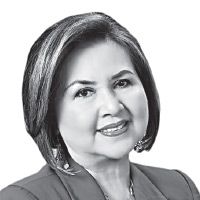60 countries review federalism systems

August 31, 2002 | 12:00am
ST. GALLEN, Switzerland — This week, 600 people from 60 countries gathered in this picture-pretty canton of 450,000 people in eastern Switzerland along the borders of Germany, Austria and Liechtenstein.
The four-day International Conference on Federalism 2002 actively engages high-level decision makers, political analysts from universities, major international publications, UN and government officials, members of world federalist movements and young professionals in reviewing the different experiences of federal countries in using the check and balance technique in preventing the abuse of power in government.
Among the participants are Meinier, Geneva muni-cipal councilor Myrna Merritt Lachenal, a Filipino nurse who used to work for Operation Brotherhood in Laos. Her Swiss husband, owner of a construction company, was once deputy of the Council of State.
This is the second world conference regarding the system of federal government since Canada initiated the first in October 1999 at Mont Tremblant in Quebec. It is a joint undertaking of the best model of the system, the Confederacy of Switzerland and her twenty-six canton governments, and was held at the well-known business and law school of the University of St. Gallen.
Sen. Aquilino Pimentel’s proposal to use the federal structure as a partial solution to the problems of ethnic and religious conflicts in Mindanao led to the Manila Federalism Conference last July in coordination with Canada.
As UNESCO Secretary General, I represented the Philippines in the "dialogue tables" together with UNESCO Club President Brian Gonzales who works with ADB, a presentor on the Youth Sector for the Work Session on Religious and Linguistic Diversities.
Notable leaders who spoke include German President Johannes Rau, Canadian Prime Minister Jean Chrétien, Austrian Chancellor Wolfgang Schüssel, Belgian Prime Minister Guy Verhofstadt as well as the Yugoslav President Vojislav Kostunica who took over when Slobodan Milosevic fled the country.
The speakers of the concluding plenary session were former Italian Prime Minister Giuliano Amato, Indian Defense Minister George Fernandes. Full policy security accompanied all the events including a ferry boat dinner trip to Austria.
The speakers representing nation-models of federal governance as well as "emerging" federations like Serbia-Montenegro and Nigeria reinforced the specially designed conference program which gathered the participants and groups of twenty-five for closer dialogues and interpolation.
Professional English, French, Italian and German interpreters helped in the smooth flow of the exchange of ideas. Total number of work sessions was twenty-four.
Work session presentor for Nation and Federal Unit Building Louis Louw, the South African federalism expert and author of South Africa, The Solution underlined the fundamentals of this system of collaboration of central government with citizens in their smaller regional blocks.
Louw found the one and a half century old Swiss Confederation phenomenal in the sense that the main federal government elects every four years a set of seven national leaders, each taking turns as president for a year as selected by the 200 representatives of the Parliament and State Council. This has prevented a monopoly of powers and corruption.
The Swiss population 7,200,000 is divided into twenty six cantons. Each canton creates its own government. In addition to cantonal law and projects, any citizen can recommend or object through a referendum.
As many as ten referendums can take place within the years in the cantons. Mr. Louw refers to the Swiss "mind set" exhibited by a determined resolve to listen to minority concern and power-sharing instead of resorting to violence.
After years of studying 180 constitutions he concluded that most of them had federal elements but about 30 only are federations. Mr. Louw also believes that federalism creates "smaller governments which are cost-effective and easier to govern." Example is Australia and her five federal states, each of which has its own form of jurisprudence.
Other than exercising "checks and balance" the federal practice promotes "unity in diversity" since it welcomes attempts to share ideas with the spirit of "co-existence."
This eventually promotes the sense of nationhood, and a more productive people. The functional literacy of the country is a pre-requisite to this form of self-governance.
Other analysis makers were Fink Haysom, former legal advisor to South Africa President Mandela, Professor Wolf Linder of the University of Berne, Elisabeth Zolck-Balmer, State Councilor of Berne. Annemarie Huber-Hotz, Federal Chancellor, was one of the Case Statement makers.
As the Philippines begins to join the global dialogue on federalism in the 21st century it is urgent to communicate how the system would actually operate to the advantage of the Filipino people.
Senator Pimentel, interviewed in Canada, explained that this idea of government-citizen collaboration to accomplish the betterment of society is still new in the country and therefore must gradually enter the awareness of the Filipinos who yearn for a better life.
The four-day International Conference on Federalism 2002 actively engages high-level decision makers, political analysts from universities, major international publications, UN and government officials, members of world federalist movements and young professionals in reviewing the different experiences of federal countries in using the check and balance technique in preventing the abuse of power in government.
Among the participants are Meinier, Geneva muni-cipal councilor Myrna Merritt Lachenal, a Filipino nurse who used to work for Operation Brotherhood in Laos. Her Swiss husband, owner of a construction company, was once deputy of the Council of State.
This is the second world conference regarding the system of federal government since Canada initiated the first in October 1999 at Mont Tremblant in Quebec. It is a joint undertaking of the best model of the system, the Confederacy of Switzerland and her twenty-six canton governments, and was held at the well-known business and law school of the University of St. Gallen.
Sen. Aquilino Pimentel’s proposal to use the federal structure as a partial solution to the problems of ethnic and religious conflicts in Mindanao led to the Manila Federalism Conference last July in coordination with Canada.
As UNESCO Secretary General, I represented the Philippines in the "dialogue tables" together with UNESCO Club President Brian Gonzales who works with ADB, a presentor on the Youth Sector for the Work Session on Religious and Linguistic Diversities.
Notable leaders who spoke include German President Johannes Rau, Canadian Prime Minister Jean Chrétien, Austrian Chancellor Wolfgang Schüssel, Belgian Prime Minister Guy Verhofstadt as well as the Yugoslav President Vojislav Kostunica who took over when Slobodan Milosevic fled the country.
The speakers of the concluding plenary session were former Italian Prime Minister Giuliano Amato, Indian Defense Minister George Fernandes. Full policy security accompanied all the events including a ferry boat dinner trip to Austria.
The speakers representing nation-models of federal governance as well as "emerging" federations like Serbia-Montenegro and Nigeria reinforced the specially designed conference program which gathered the participants and groups of twenty-five for closer dialogues and interpolation.
Professional English, French, Italian and German interpreters helped in the smooth flow of the exchange of ideas. Total number of work sessions was twenty-four.
Work session presentor for Nation and Federal Unit Building Louis Louw, the South African federalism expert and author of South Africa, The Solution underlined the fundamentals of this system of collaboration of central government with citizens in their smaller regional blocks.
Louw found the one and a half century old Swiss Confederation phenomenal in the sense that the main federal government elects every four years a set of seven national leaders, each taking turns as president for a year as selected by the 200 representatives of the Parliament and State Council. This has prevented a monopoly of powers and corruption.
The Swiss population 7,200,000 is divided into twenty six cantons. Each canton creates its own government. In addition to cantonal law and projects, any citizen can recommend or object through a referendum.
As many as ten referendums can take place within the years in the cantons. Mr. Louw refers to the Swiss "mind set" exhibited by a determined resolve to listen to minority concern and power-sharing instead of resorting to violence.
After years of studying 180 constitutions he concluded that most of them had federal elements but about 30 only are federations. Mr. Louw also believes that federalism creates "smaller governments which are cost-effective and easier to govern." Example is Australia and her five federal states, each of which has its own form of jurisprudence.
Other than exercising "checks and balance" the federal practice promotes "unity in diversity" since it welcomes attempts to share ideas with the spirit of "co-existence."
This eventually promotes the sense of nationhood, and a more productive people. The functional literacy of the country is a pre-requisite to this form of self-governance.
Other analysis makers were Fink Haysom, former legal advisor to South Africa President Mandela, Professor Wolf Linder of the University of Berne, Elisabeth Zolck-Balmer, State Councilor of Berne. Annemarie Huber-Hotz, Federal Chancellor, was one of the Case Statement makers.
As the Philippines begins to join the global dialogue on federalism in the 21st century it is urgent to communicate how the system would actually operate to the advantage of the Filipino people.
Senator Pimentel, interviewed in Canada, explained that this idea of government-citizen collaboration to accomplish the betterment of society is still new in the country and therefore must gradually enter the awareness of the Filipinos who yearn for a better life.
BrandSpace Articles
<
>
- Latest
- Trending
Trending
Latest
Trending
Latest
Recommended





























